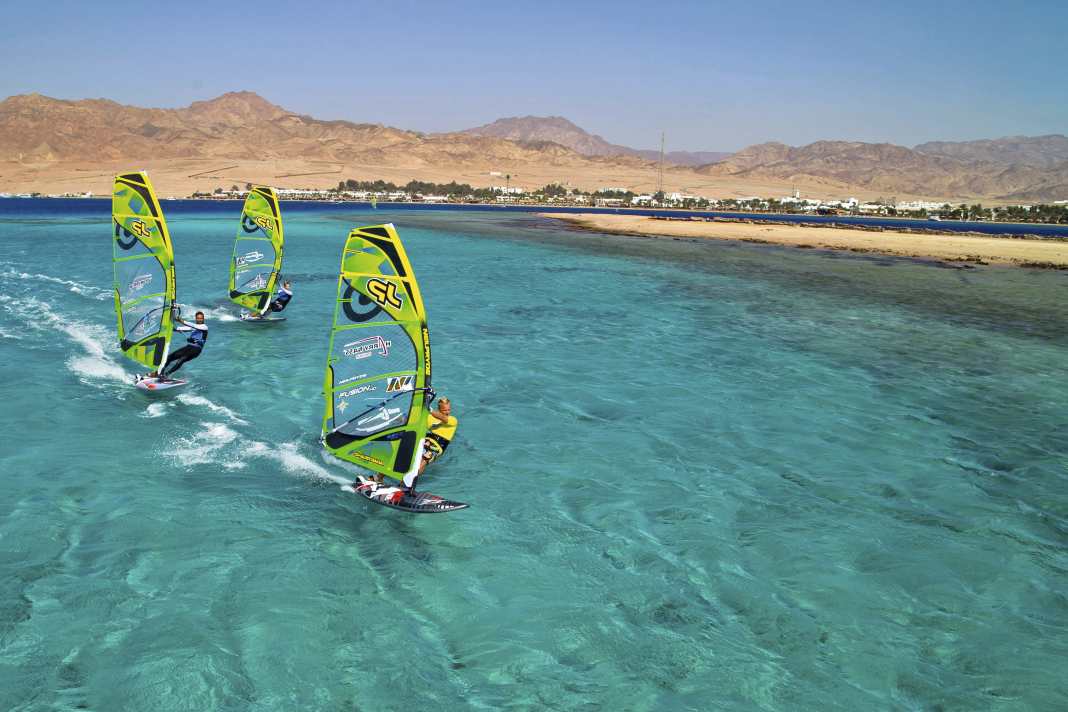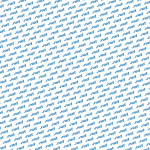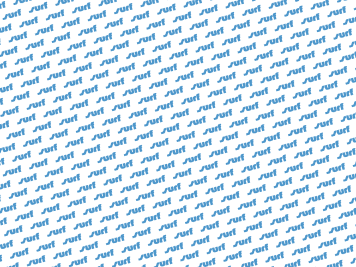In the beginning, there weren't even any palm trees in Dahab. Over the course of 25 years, the Harry Nass Centre in the south of the Sinai Peninsula has grown from a centre with perhaps 70 boards to an empire with 500 boards in four different centres. We wanted to know who is behind such a success story and caught Elke and Harry Nass for an interview.
Harry, your windsurfing career began with a false start?
Harry: Yes, I stayed in year 7 with five fives and two sixes. Because I had started surfing in Holland and was really hooked.
Elke: You read surf under the table at school.
Harry: No, not that, but back then I actually learnt the surf by heart - forwards, backwards. And two or three times a week I went to the surf shop in Dortmund and watched Hawaii videos for hours.
For many, such a lap of honour would probably have meant the end of their surfing career.
I then completed my secondary school leaving certificate and did an apprenticeship at a bank. Fortunately, I was only taken on for three months afterwards.
Fortunately?
Yes, that left me unemployed and I did my surf instructor's licence during that time. In 1984, I started working as a surf instructor with Michi Bouwmester on Lake Garda. I lived there together with Ralf Bachschuster. At that time, well-known riders such as Axel Ohm and Cesare Cantagalli often came by.
They were travelling as regatta surfers at the time?
Yes, Ralf had just started, I think he was sponsored by Mistral. After the first surf instructor season, I flew straight to Lanzarote - to spend the winter - that's what we called it. We had a house on the beach with Ralf Bachschuster, Charly Messmer and Frank Maas. Jürgen Hönscheid came over from Fuerte. We were there for three or four months, it was a great time.
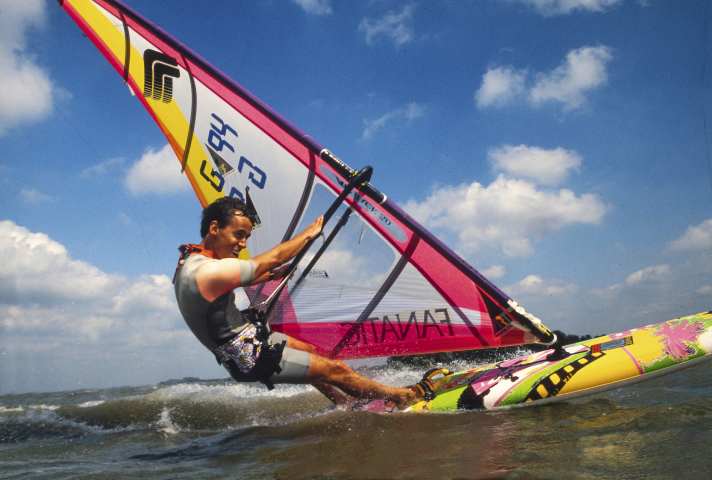
That worked out financially?
What you earned as a surf instructor was spent again in six months. In between, I also worked shifts for six weeks in a pipe factory. I ground steel pipes from the inside. I wasn't too bad for that. Between 1984 and 1986, I got to know a lot of regatta surfers and then also joined the Euro Funboard Cup.
How did that fit in with the surf instructor job?
From 1986 onwards, I really only travelled around. I had a sponsor from the steel industry who supported local athletes. I often appeared in the local media back then, Ruhr-Nachrichten, Westfälische Rundschau and so on. But the sponsor didn't want me to put any stickers on my sail. They simply gave me an envelope with 3000 marks in it every month.
That was a lot of money back then. Did the windsurfing companies pay well at the time?
No, but I did get a lot of material. I often travelled to Fanatic in Ransbach with my bus to pick up the latest material. It was a big factory, there were five loading bays and that's where my new material was. There were times when there was no one there to hand over the equipment. Then the old material was taken away and sold. From 1980 to the end of the 80s, the companies literally threw material at the drivers.
From 1980 to the end of the 80s, the companies literally threw material at the drivers."
How did you approach the material sponsors as a still-no-name?
In 1986 on Lake Garda, I was working part-time in Torbole in the trendy surfer pub Cutty Sark, clearing glasses. That paid 5000 lire, which was good - but what was better was that everyone knew me. People like Peter Brockhaus, then head of F2, would come in in the evening and greet me with "Hello Harry". Rainer Ramelsberger was one of the guests, he made Gaastra back then. I once told him that I was going to the Funboard Cup in Holland in three weeks' time and that WDR was going to make a short film about it. He immediately wanted to know if I needed any material and wanted my address. I called my mum every three or four weeks and she was really excited the next time I called - the whole cellar was full of surfing equipment. Rainer had just sent two complete sets of sails - Race and Wave - to my house. The film wasn't even shown throughout NRW, but only in Dortmund. But that didn't matter. I sold almost all my new equipment and got another year on. In 1990, I finished racing and started my first surf school on Lanzarote.
Another false start?
I had the wrong partner at my side back then. He was actually a kind of louse. At some point, he caught up with his son and literally kicked me out of school. We didn't even have a written contract in surfing terms. Before I left the island in 1992, he slashed all four tyres on my car. Fortunately, I already had a good reputation in the industry at the time.
My partner at the time slashed all four of my tyres before he left."
What was it exactly?
In the two years on Lanzarote, people realised: "He's reliable, you can work with him, he's not just there for six months." The tour operators were looking for people they could send to their stations.
Were those the early years of the travel industry?
Yes, I got to know Franz Schlittenbauer at the time when he was on an F2 dealer trip to Lanzarote. Franz said he wanted to sell surf holidays in the future, which would be better than having a warehouse full of boards. I met Franz again later when I was station manager on Kos. He then became something like my foster father in the industry.
A football fan community was probably less important to you.
Franz was a real Bavarian, I'm a Westphalian and actually a full-on Borussian. But last season pulled the plug on me. I'm happy for Leverkusen now, but I don't really like watching them anymore.
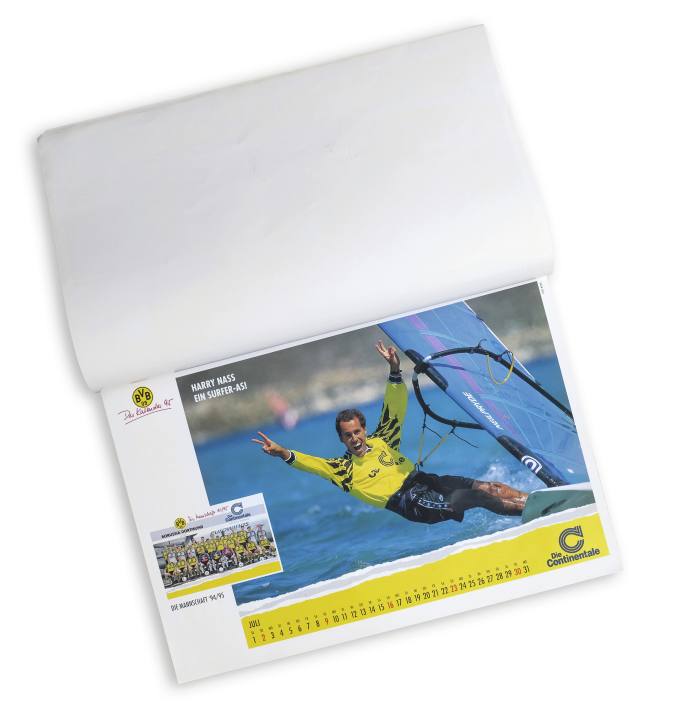
What was your connection then?
Franz was my father's age, he simply always supported me. I also came to Alaҫati through him.
Where not everything went according to plan at the beginning?
Exactly. We had leased a plot of land and set up a centre. In our second year in Turkey, we were about to be ripped off. There was an appointment with the local authority and a minimum bid of 60,000 marks was required for the lease to continue. I refused to play the game with my hotelier and we offered 60,001 marks. There were other locals who didn't really know anything about the station business but had dollar signs in their eyes and they offered more. When we left, they actually wanted to know where we had to pick up the holidaymakers. I told them that nobody would come to them because the guests would come to me and not to some random place on the beach. The hotelier knew the owner of the neighbouring property, we set up four floodlights and set up a new station in four weeks in 24/7 shifts. Then in 1999, again via Franz, I received an offer to buy the centre in Dahab.
So you struck immediately?
Harry: The station was supposed to cost a whopping quarter of a million. But the previous owner is Swabian and had meticulously written down all the finances, every stamp. As a banker, I could see in ten minutes what "return on investment" could be achieved in a year.
Elke: I met Harry on holiday in Dahab in 2000. I was already hooked on windsurfing and immediately quit my job as a designer. Franz (Editor: Schlittenbauer) also came up with so many ideas in the early days. Faxes arrived at Harry's, they curled up on the floor and in the end the roll was empty.
How long did it take to grow from one surf centre to an empire with four locations?
Harry: It really got going when Elke started working with us.
Do you complement each other well?
Elke: Harry still does everything to do with finance today. I come from a design background and have been involved with the visuals right from the start, developing a clothing collection for the employees and looking after the staff. I designed Station 2 myself. It was the most beautiful station at the time and strategically the best place to start. You can take off directly from there on a half-wind course.
Harry: Elke also takes care of all orders, imports and marketing, including social media and press releases.
Even the coffee cups are in one direction in our cupboard."
The order at your stations is remarkable, the sails hang exactly in line with the base plates.
Elke: There is no second chance to make a first impression. Harry, for example, always checks that the flags aren't tattered. Our coffee cups are also lined up in one direction in the cupboard. We are also targeting a clientele that spends a lot of money on holidays. You can't just mess around with that.
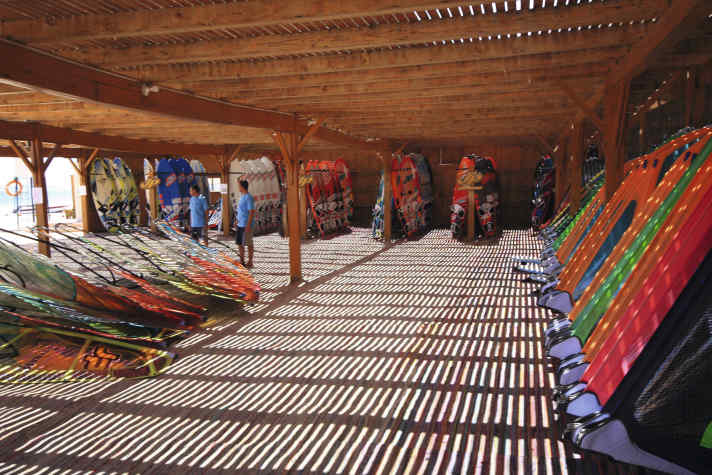
How are your employees coping?
Elke: They have to go through it (laughs). Sometimes you start with the soup. Washing, brushing teeth. But we are very loyal to our employees. For example, we wouldn't make a station somewhere in the desert. Where would their children go to school?
Harry: Elke is the mother of the nation. She teaches the boys a lot and they love it.
Windsurfing once had quite a peak, how did you experience it?
Harry: That was in 2010, when I sponsored the Worldcuppers Robby Swift and Micah Buzianis. We had Ride & Learn events with 60 participants.
Is it more difficult to do business in Egypt than elsewhere?
Harry: You need someone to deal with the bureaucratic paperwork, for us it's Mustafa, for whom we put our hand in the fire. Our business partners, such as the hoteliers, are highly educated entrepreneurs, so we've never had any problems.
Elke: Neither do I as a woman. But I'm often asked about it by Europeans. In the beginning, I was sometimes Madame Harry. That was rather amusing.
Harry: In Turkey, I had to work more with elbows. Some locals probably thought that Harry had a good business and how they could take it away from him. In Egypt, it's the other way round. If you are successful, you are respected. You are a role model.
What has changed the most in windsurfing training?
Harry: People learn windsurfing much faster today. In the 80s, you first explained to them how to rig, showed them where the mast goes in, what a long or short batten is. Now we get out on the water as quickly as possible, I want every beginner to be able to surf at least a little after two hours.
We are still in the mood and simply feel at home in Dahab."
You've always spent at least six months in Dahab for 25 years. That sounds tempting and daunting at the same time.
Elke: Life on the beach is already super exhausting, the heat ... but as soon as the wind is good, we go out on the water. This passion has never left us. That's why you can stand it.
Harry: Every time we sit at our bar at Centre 1, I think to myself: "We did everything right - and we were lucky too." It's the most beautiful place in Egypt. It's the mountains, the lagoon. The area in Dahab is so comfortable that we can have fun here well into old age. I now also go wingsailing a lot, practising new manoeuvres in the lagoon - we still feel like it and just feel good there.
